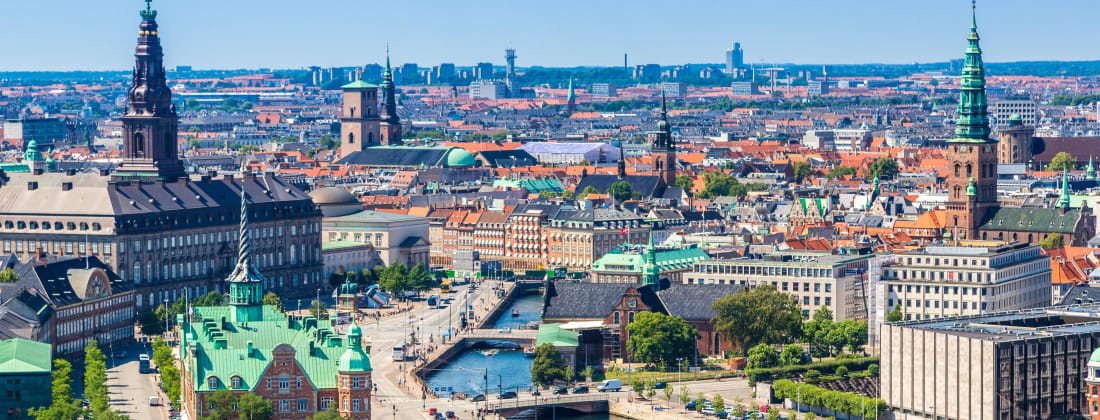Study Bachelor in Denmark 2024
Study in Denmark
Located in northern Europe, Denmark is the southernmost of the Scandinavian countries. The Baltic Sea lies to the east and the North Sea to the north and west. Sweden and Norway lie beyond the North Sea and Germany lies to the south, the only country to share a border with Denmark. The nation is made up of the peninsula of Jutland and 443 islands. The land is low and flat, with arable plains inland and many sandy beaches and dunes along the coast. The climate is temperate, with mild winters and cool summers. Although it is a constitutional monarchy, the monarch is a symbolic ruler and the nation is governed by an elected parliament and prime minister. It is known as the home of Hans Christian Anderson and the Lego Corporation.
The people of Denmark are extremely educated. It boasts the fourth highest number of tertiary degree holders in the world. Degree seeking students may choose to attend one of the nation’s excellent universities, university colleges or business academies. It was the first country to implement environmental law, and many of its universities and institutions specialize in environmental research.
All colleges and universities are free to the residents of Denmark, and students may apply for stipends to cover their living expenses as well. Students from the European Union and Switzerland and those participating in exchange programs may also study for free. Students outside the EU who wish to study undergraduate studies in Denmark are required to pay tuition, which varies from one institution to another but can range from around 6,000 to 16,000 Euros. However, many programs and scholarships are available to assist with the cost of a Danish education.
Most universities are on a two-semester system that runs from September to June, with semester exams in January and June. July and August are set aside for the summer holidays. Some universities have changed to a four quarter academic year. Each quarter consists of eight weeks of lessons followed by one week for exams and another week of break before the next quarter begins.
Depending on the institution and the program chosen, it can take three to four and a half years to earn a bachelor’s degree in Denmark. Most programs combine theoretical study with research and practical application, and many offer the opportunity to complete internships with industry professionals.
Denmark’s high quality learning institutions and excellent standard of living make it an attractive option for students pursuing undergraduate studies. It offers over 500 degree programs taught entirely in English. Many programs are project and research based and encourage collaboration among students and with industry experts. Denmark is frequently listed as one of the happiest countries in the world.
Change currency
Basic monthly living cost
Rent in a shared flat
599Share of utilities
67Internet subscription
33Local transportation
68
Sample lifestyle cost
Fast food combo
12Cinema ticket
16Pint of local beer
7
About Denmark
Higher Education in Denmark
Denmark uses the traditional three-tier degree system with bachelor’s, master’s and doctoral degrees. There are four types of institutions of higher education: universities, university colleges, academies of professional higher education and university level institutions that provide instruction in the arts and architecture. All types of higher education institutions may offer master’s degrees; however, some offer only bachelor’s degrees.
Why Study in Denmark?
Higher education institutions in Denmark offer nearly 200 master’s degrees taught in English across a wide variety of academic disciplines, including humanities; natural, health and social sciences; technology; business and economics; and information technology. In addition, students will find that their learning extends well beyond the classroom. Educators in Denmark believe in providing practical as well as classroom experience, and many lecture courses are augmented with real-life experiences through industry partners that teach students problem solving and teamwork skills.
Universities in Denmark
There are more than 40 higher education institutes in Denmark, and many offer master’s degree programs. There are eight universities, with some schools offering a range of academic disciplines and other focusing on specialized areas such as information technology, technology, or business. Thirteen university level institutions specialize in all levels of degrees in fine and performing arts, design and architecture. Four of the eleven university colleges also offer master’s degrees, and one of the ten academies of professional higher education offers an MBA program.
Tuition and Program Duration
Tuition for all master’s degree programs in Denmark is free for students from EU/EEA nations. Students from other countries can expect to pay about €6,000 to €16,000 per year in tuition. However, many scholarships and grants are available from various public programs, foundations and the institutions of higher education themselves. For example, the Erasmus Mundus program is available to all students for specific master’s degree programs and Fulbright scholarships are available for students from the US.
Nearly all master’s degree programs are two years in length. A few research-oriented technical programs require a thesis in addition to course work.
Academic Year
The academic year in Denmark typically runs from early September until the end of June and consists of two semesters, although some schools use four quarters instead. The autumn semester usually finishes in December, with exams in January and the spring semester finishes in May, with exams in June.
Post-Graduate Opportunities
All students are welcome to remain in Denmark for employment after they graduate and Danish companies are particularly interested in hiring candidates with good English skills. Nordic citizens (Finland, Iceland, Norway and Sweden) do not require visas, residence permits, or work permits. EU/EEA and Swiss citizens do not need a work permit, but must obtain a registration certificate to work for more than three months. Students from other countries need a residence permit to work in Denmark; however, upon graduation their existing residence permit can be extended for six months to allow them to find employment.
Visa Requirements
Students from EU/EEA countries and Switzerland do not require a visa, but will need a registration certificate (EU/EEA citizens) or registration card (Switzerland) if they will be studying in Denmark for more than three months.
Students from other countries should check the list of countries that require a visa in Denmark to see if their country is on it. Students who require a visa may apply for one at the Danish embassy, consulate or mission in their home country. In addition, students who will be studying in Denmark for more than three months must obtain a residence permit prior to arriving in Denmark. The residence permit should be applied for after the visa is obtained.
Health Insurance
All international students residing in Denmark have access to free health care with some exceptions, such as dental care. However, students must register with the Danish Civil Registration System to obtain this care. Non-EU/EEA/Swiss students who do not register are entitled to free emergency services only and unregistered EU/EEA/Swiss students may use their European Health Insurance Card for coverage.
Tips
Denmark has a very sophisticated public transportation network that includes boats, ferries, buses, trains, taxis, metros and even bike rentals. Many students will find they need no automobile while studying in Denmark.
Visa Requirements
ST1 - residence and work permit for exchange students from non-EU/EEA/Nordic countries.
What type of Visa do you need?
Visa name
Residence and Work Permit (ST1)
Price and currency
EUR 310
Visa application fees depend on your country of origin and can be around 310 EUR. The fees may be subject to change.
Who can apply for the visa?
If you plan to study in Denmark for more than three months, you will need either a registration certificate or a residence permit:
- EU/EEA citizens will need a registration certificate, and Swiss nationals will have to apply for a residence card.
- Non-EU/EEA citizens will have to apply for a Danish residence permit prior to arriving in Denmark.
You need to be admitted to a higher educational program in Denmark, which is approved by a state authority or offered by a publicly accredited educational institution.
Where can you make the application?
Danish diplomatic mission
You will need to submit in person your ST1 application at the nearest Danish diplomatic mission. The reason you need to appear in person is so that you can have your biometric features recorded (digital facial image and fingerprints). Your biometric features are a requirement for the resident permit. You will most likely need to book an appointment.
How to make the application?
You typically need to provide the following when applying for a student visa to Denmark:
- Acceptance letter from your university;
- A signed and completed application form;
- Language proficiency proof (usually English);
- A valid passport or another form of travel document;
- A passport photo;
- Travel insurance;
- Visa fee payment proof;
- Proof of minimum funds (around 1000 EUR/month);
- Detailed information regarding your study program;
- Proof regarding accommodation arrangements during your studies.
When should you apply?
The best time to start applying for your residence permit to Denmark is three months prior to your arrival date. It takes, on average, about 60 days for the application to be processed and the duration of your student residence permit depends on whether you are going to complete an entire education program, or only follow part of a program as a guest student. If it is to be an entire program, then you will be granted a residence permit for the duration of that program. However, if you are only enrolled to follow a part of a program, the residence permit will be granted for a maximum of two years.
Processing time
60 Days
Work opportunities
- Nordic, EU/EEA or Swiss citizens can work in Denmark with no restriction on the number of hours.
- Non-EU/EEA and non-Nordic students are allowed to work in Denmark 20 hours a week from September to May and 37 hours a week from June to August.
Hours per week
20
Why do you need this type of visa?
Your visa application may be rejected if you are not able to show proof of the required funds, or if you provide incorrect or incomplete documents.
Institutions
- WINGS - Wismar University (Germany)
- South Gate Creative Writing School
- University College Absalon
- Aros Business Academy
- Aarhus University
- Zealand Business College ZBC
- University College Lillebælt / UCL University College
- Martec - Maritime And Polytechnic College
- Basic Health Care College Of FVH
- Kalo Organic Agricultural College


